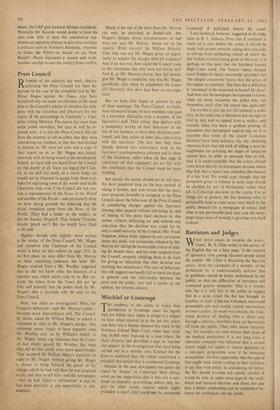Press Council
RFADERS of our editorial last week, sharply criticising the Press Council for their be- haviour in the case of the complaint laid by Mr. Bryan Magee against the Times, may Have wondered why we made no reference at the same time to the Council's rebuke of ourselves (in com- pany with the Guardian and Observer) for Our report of the proceedings in Chatterley v. Chat- terley (citing Mellors). The reason has since been made public elsewhere, but may as well be re- peated now: it is that the Press Council did not have the courtesy to tell us either that they were considering our conduct, or that they had decided to censure us. We were not even sent a copy of their report on us, as Mr. Magee was (simul- taneously with its being issued to the newspapers). Indeed, we have still not heard from the Council on this matter at all. Since we regard the Coun- cil, as we said last week, as a comic body,. we would not be disposed to accept from them a re- buke for reprinting some of the words used in the Chatterley trial, even if the Council did not con- tain a representative of the News of the World and another of the People—and particularly since we have strong grounds for believing that the initial complaint came from the News of the World. (They had a leader on the subject; so did the Sunday Dispatch. That Jemmy Twitcher should 'peach me!) But we would have liked to be told.
Slightly—though only slightly—more serious is the matter of the Press Council, Mr. Magee and ourselves (the Chairman of the Council writes a letter on this subject on page 255). In the fiat place, we must differ from Mr. Murray on what constitutes rudeness; the letter Mr. Magee received from a Mr. Woolley suggested that he did not know what the function of a reporter was, which seems rude to us. But cer- tainly the letters from the Times did not `go fully and patiently into the points made by Mr. Magee'; that is precisely why he went to the Press Council.
Next, was there an investigation? Here, the Council's behaviour—and Mr. Murray's letter— becomes more extraordinary still. The Council, he claims, asked Sir William Haley to submit a statement in reply to Mr. Magee's charges. This statement seems simply to have repeated what Mr. .Woolley said, on Sir William's behalf, to Mr. Magee; hence ow inference that the Coun- cil had simply quoted Mr. Woolley. But what they did do was surely even more questionable. They accepted Sir William Haley's statement in reply to Mr. Magee, without giving Mr. Magee a chance to bring forward the proof of his charges which he had told them he was prepared to do; and then to tell him--and the newspapers ---that he had 'failed to substantiate' a case he had been deprived of any opportunity to sub- stantiate. Much of the rest of the letter from Mr. Murray can only be described as double-talk. Mr. Magee's charges about mis-statements of faet were not, says Mr. Murray, 'borne out by the reports.' What reports? Sir William Haley's? Then why was not Mr. Magee given an oppor- tunity to support his charges with his evidence? And if he was not, how could the Council come to the conclusion that they were not borne out? And if, as Mr. Murray claims, they did investi- gate Mr. Magee's complaint, why was Mr. Magee specifically told, when he telephoned the Coun- cil's Secretary, that there had been no investiga- tion?
But we have little hopes of answers to any of these questions. The Press Council, we learn, have refused to let any of their members take part in a television discussion with a member of the Spectator's staff. They refuse, they declare with a pomposity worthy of their behaviour in the rest of this business, to have their decisions ques- tioned, and they refuse to enter into controversy with the Spectator. The fact that they have already entered into controversy both in the Spectator's correspondence columns and in those of the Guardian, rather takes the fine edge of conviction off that argument; we are left with the conclusion that the Council want no more mauling.
But clearly the matter should not be left here. We have pondered long on the best method of taking it further, and now reveal that the Spec- tator proposes formally to complain to the Press Council about the behaviour of the Press Council in considering charges against the Spectator (among other papers) without informing us, and of issuing to 'the press their .decision in this matter, without informing us, and without any indication that the decision was voted for by only a small minority of the Council. (Mr. Frank Singleton, whose letter appears in our correspon- dence this week, was pompously rebuked by Mr. Murray for taking the honourable course of mak- ing his dissent clear, and has now resigned from the Council, properly rebuking them as he went for giving no indication that their decision was anything but unanimous.) This sort of behaviour (we will suggest) can hardly fail to harm.the press in general—and the relationship between the press and the public, too; and it merits, in our opinion, the severest censure.






































 Previous page
Previous page